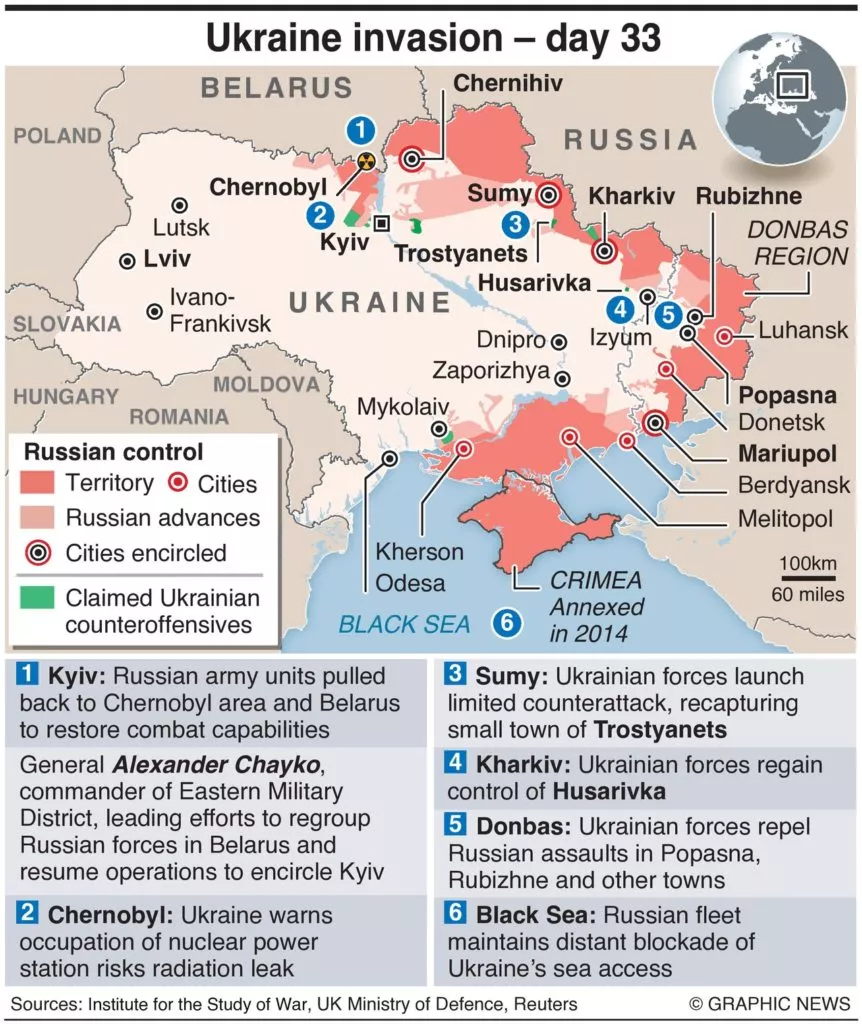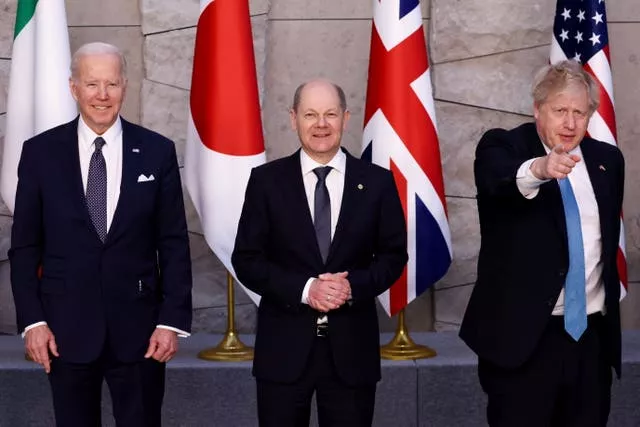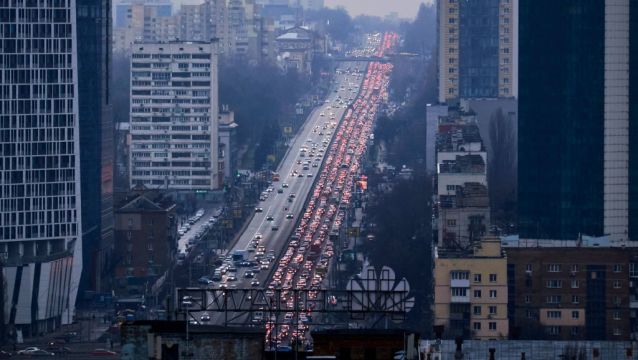What you need to know right now:
- Ukraine and Russia were preparing for their first face-to-face peace talks in more than two weeks, with Kyiv insisting it would make no concessions on Ukraine's territorial integrity as battlefield momentum has shifted in its favour.
- About 160,000 people remain trapped in besieged Mariupol without power and the city needs to be completely evacuated, its mayor said, but Ukraine's deputy prime minister said no humanitarian corridors from the port were possible on Monday due to reports of Russian "provocations".
- Russia is trying to split Ukraine in two to create a Moscow-controlled region after failing to take over the whole country, the head of Ukrainian military intelligence said.
- The disposition of Russian forces during the past 24 hours has seen no significant change, but Russia has gained more ground in the vicinity of Mariupol, British military intelligence said.
- The Kremlin said peace talks between Russia and Ukraine were likely to start in Istanbul on Tuesday and said the face-to-face contacts were important despite scant progress in negotiations so far. A senior Turkish official had said earlier the talks would start on Monday.
- Russian Foreign Minister Sergei Lavrov said President Putin and Ukraine's President Zelenskiy should meet when the two sides were closer to agreeing on key issues.
- Top US officials said the United States does not have a policy of regime change in Russia, ramping up efforts to clarify President Biden's statement that Putin "cannot remain in power".
- The UN human rights office said 1,119 civilians had been killed and 1,790 wounded since Russia began its attack on Ukraine.
- Ukraine has asked the International Committee of the Red Cross not to open an office in Russia's Rostov-on-Don, saying it would legitimise Moscow's "humanitarian corridors" and the abduction and forced deportation of Ukrainians.
- Russia's invasion has so far cost Ukraine $564.9 billion in terms of damage to infrastructure, lost economic growth and other factors, Economy Minister Yulia Svyrydenko said.

13:20 Ukraine and Russia were preparing on Monday for the first face-to-face peace talks in more than two weeks, with Kyiv insisting it would make no concessions on ceding territory as battlefield momentum has shifted in its favour.
Ukrainian officials played down the chances of a major breakthrough at the talks, due to be held in Istanbul after Turkish President Tayyip Erdogan spoke to Russia's Vladimir Putin on Sunday.
But the fact that they were taking place in person at all - for the first time since an acrimonious meeting between foreign ministers on March 10 - was a sign of shifts behind the scenes as Russia's invasion has become bogged down.
On the ground, there was no sign of respite for civilians in besieged cities, especially the devastated port of Mariupol, whose mayor said 160,000 people were still trapped inside and Russia was blocking attempts to evacuate them.
The Kremlin, for its part, said it was alarmed by comments by U.S. President Joe Biden, who said during a speech on Saturday that President Vladimir Putin must not remain in power.
8:54 Russian forces are regrouping but are unable to advance anywhere in Ukraine, Ukrainian Deputy Defence Minister Hanna Malyar said on Monday.
She said Russian forces were trying to reinforce positions they already hold and were trying to break through the defences of Kyiv but had no hope of capturing the capital.
"As of today, the enemy is regrouping its forces, but they cannot advance anywhere in Ukraine," she told a briefing, without providing evidence of the Russian troop movements.
As Turkey is set to host talks alter this week, Ukraine's head of military intelligence, Kyrylo Budanov, said Russian President Vladimir Putin was aiming to seize the eastern part of Ukraine.
"In fact, it is an attempt to create North and South Korea in Ukraine," he said, referring to the division of Korea after World War Two.
It comes as Zelenskiy has urged the West to give Ukraine tanks, planes and missiles to help fend off Russian forces.
Ukrainian President Volodymyr Zelensky has said his government would consider declaring neutrality and offering security guarantees to Russia, including keeping Ukraine nuclear-free.
He told independent Russian journalists on Sunday that the issue of neutrality – and agreeing to stay out of Nato – should be put to Ukrainian voters in a referendum after Russian troops withdraw.
He said that a vote could take place within a few months once Russian troops leave. Russia quickly banned Mr Zelensky’s interview from being published.
Roskomnadzor, which regulates communications for Moscow, issued the ban on Sunday, saying there could be action taken against the Russia-based media outlets that took part, which included “those that are foreign media outlets acting as foreign agents”.

Mr Zelensky responded by saying Moscow was afraid of a relatively short conversation with journalists. “It would be funny if it weren’t so tragic,” he said, according to the Ukrainian news agency RBK Ukraina.
Mr Zelensky also said Ukraine’s priorities at the Ukrainian-Russian talks in Turkey this week will be “sovereignty and territorial integrity”.
“We are looking for peace, really, without delay,” he said. “There is an opportunity and a need for a face-to-face meeting in Turkey. This is not bad. Let’s see the outcome.”
This week, he said, “I will continue to appeal to the parliaments of other countries” to remind them of the dire situation in besieged cities like Mariupol.
Meanwhile, German Chancellor Olaf Scholz said that neither Nato nor US President Joe Biden aim to bring about regime change in Russia.

Mr Biden said of Mr Putin during a speech on Saturday that “this man cannot remain in power”. The White House and other US officials rushed to clarify that Mr Biden was not actually calling for Mr Putin to be toppled.
Asked during an appearance on ARD television on Sunday whether Mr Putin’s removal is in fact the real aim, Mr Scholz replied: “This is not the aim of Nato, and also not that of the American president.”
Mr Scholz added: “We both agree completely that regime change is not an object and aim of policy that we pursue together.”
Asked whether Mr Biden made a dangerous mistake with his comment, Mr Scholz replied: “No.” He said that “he said what he said” and Secretary of State Antony Blinken also had clarified that he was not talking about regime change.
Mr Scholz last month announced a big increase in German defence spending. On Sunday, he confirmed a report by the Bild am Sonntag newspaper that the government is considering acquiring a missile defence shield along the lines of Israel’s “Iron Dome”.







